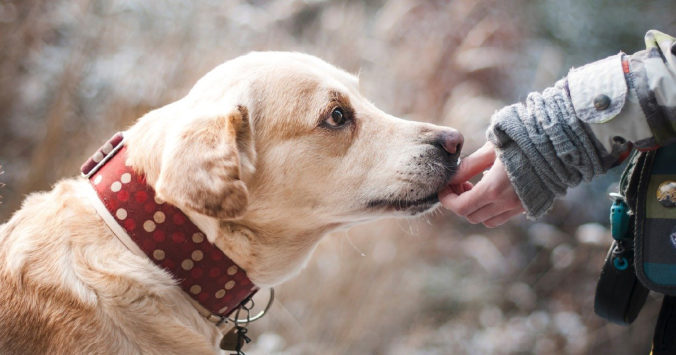By Jasmine Cabanaw
If your dog has ever tried to lick your face after licking its own butt, you’ve probably had a moment when you questioned how sanitary your fur baby is. Fortunately, dog butt to human face isn’t a known transmission of the coronavirus COVID-19. The ability for the virus to directly transmit from a dog or cat to a human appears to be not possible. However, due to the ability of the virus to live on surfaces, people who have animal companions still need to take extra precautions to prevent the virus from spreading.
The Centers for Disease Control and Prevention suggests pet owners restrict contact with pets and other animals if the owner is infected with COVID-19. That includes “petting, snuggling, being kissed or licked, and sharing food.”
Can Your Pets Get COVID-19?
As of March 17th, two dogs have tested positive for COVID-19 in Hong Kong. This is not concrete evidence that humans can pass the virus to their pets and experts caution that more tests and studies need to be done. The current consensus is that pets are highly unlikely to get COVID-19 from humans.
Sadly, the first dog — a 17 year old Pomeranian — died after returning home from quarantine. The dog belonged to a 60-year-old woman who recovered from COVID-19 herself. At the time of the dog’s release, blood tests came back negative. The negative results could mean that the original positive was from traces of the virus around the dog’s mouth. The other possibility is that the dog was infected — The Agriculture, Fisheries and Conservation Department cautioned that, “It is known in some asymptomatic or mild cases of human infections with other types of coronavirus that antibodies may not always develop.” However, it is more likely that the dog passed away from stress and health complications compounded by the quarantine and old age.
The second dog to test positive is a German Shepherd living in the Pok Fu Lam area on Hong Kong Island. The dog’s 30-year-old owner also tested positive for COVID-19. Health officials are now strongly advising people to take extra precautions with their pets. While it is unlikely that cats and dogs can directly infect humans with the virus, these cases show that the jury is still out on whether dogs can catch the virus from people. While the likelihood of your dog or cat getting COVID-19 is slim, in these uncertain times, it is best to err on the side of caution and to check with sources such as the World Health Organization for updates.
How to Protect Your Pets (And Yourself) During COVID-19
How do we protect ourselves and our fur babies? With many countries already struggling with a shortage of COVID-19 tests for humans, it is unlikely that these countries will begin testing on domestic animals. The best thing a pet owner can do for their animal companions is to take matters into their own hands (mainly, by washing them). The main thing to consider is how coronavirus can survive on surfaces, which includes pet collars, leashes, etc. The information below contains suggestions on how to keep your pets, yourself, and your family protected from COVID-19.
1. Stop Kissing Your Pets
Now is not the time for smooching. With lockdown, social distancing, self-quarantine, and shelter in place orders being implemented in various countries, humans are craving physical affection. A natural solution is to snuggle with the fur babies, but humans need to keep the health of their animal companions in mind as well as their own.
Does this mean that you can’t touch your pets? No. In fact, health officials are urging people not to abandon their pets. Treat your pets as if they were your babies, because in a way they are. Which means you simply follow the same protocols you would for other humans. COVID-19 transmits through droplets, so your pets are most at risk in getting covered in the virus when you are giving them kisses or letting them lick your face. In other words, it’s time to friend-zone your pets.
2. Limit Doggy Playdates
Humans aren’t the only ones who need to practice social distancing. Since the virus can live on surfaces, including animal fur, it is best to keep your pets away from other animals. All that romping around in the dog park gets your dog covered in grass, mud, saliva from other dogs, and potentially, COVID-19. With shelter in place orders in effect, it is also wise to reduce risks to your dog’s health in general so that you can avoid taking a trip to the veterinarian’s office. This goes for other animal companions as well. It’s time to be extra cautious with their health. Save the playdates for another time.
3. Hands Off My Pet!
Taking your dog, cat, bird, rat, goldfish etc. out for a walk is a good way for both you and your pet to get some exercise. As long as you practice social distancing, both of you should be safe from the virus. But remember to treat your animal companion like any other member of your household. People should not be petting your dog right now, even though that was considered normal behavior just a few weeks ago. If someone wants to interact with your pet while you are out, keep a distance of at least six feet away and politely explain that your pet is practicing social distancing, too.
3. Wash Your Hands — And Your Pets
Since droplets containing the virus can land on objects and surfaces, it is important to wash your hands the second you get home from an outing. Consider using hand sanitizer before you even open your door. Depending on where you went with your pet, it would be a good idea to give your pet a bath upon returning home, too. All that hand washing isn’t going to count for much if your dog or cat is spreading the virus throughout your house.
4. Keep Outdoor Cats In
This may be a tough one, but outdoor cats need to remain indoors. Yes, your cat may adopt Garfield-type behaviors and mope about and maybe demand lasagna. This is better than your cat bringing the virus inside and infecting your household. Have lots of toys and games on hand for your newly indoor kitty and be sure to give your cat extra attention to keep them from getting too bored. Just remember — no smooching, scritches and pats only. And wash your hands first.
5. Have a Reasonable Supply of Food, Treats, and Supplies
Pet stores are not considered essential businesses and will be closed in areas that are in lockdown or have mandated shelter in place. Stock up on your pets’ favorite toys, food, and treats while there is time. What is a reasonable supply? Don’t become the pet owner version of a toilet paper hoarder — a month’s supply is considered enough. Also make sure that any pet medication is refilled and that you have a pet emergency kit in the house.
6. What If You Have COVID-19?
The CDC recommends that people infected with COVID-19 should restrict contact with their animal companions, just like they would do with other humans. This doesn’t mean having no contact, but having limited and cautious contact. So, wash your hands before you take the dog for a walk, don’t let your pets sleep in the same bed as you, keep pets off furniture (or you can avoid certain pieces of furniture… we know that with certain pets this will be a standoff), and no smooching.
7. Help a Shelter Animal
People in self-isolation are prone to increased depression, anxiety, and loneliness. This is how shelter animals feel all the time. Consider adopting or fostering a shelter animal during this period to help reduce the blues. You would be saving a life while gaining a companion. Even if you have COVID-19, the grim reality is that animals at kill shelters are more likely to die if they aren’t adopted than they would be from getting coronavirus. So take precautions, and opt for animal snuggles while you wait out your home quarantine.
Pets and COVID-19 — We Are All Connected
If the recent cases of dogs contracting the COVID-19 virus show us anything, it’s that we are more connected to our animal companions than many of us realize. In a rapidly changing world, it is important now more than ever to realize that we are all connected. Every action we take has a cause and effect and sends a ripple out into the world. Take advantage of this time to pause and reflect, with your animal companions safely by your side.
Green Bamboo publishes stories of animal rescue, friendship, and kindness. Check out our selection here and support animal rescue organizations.



